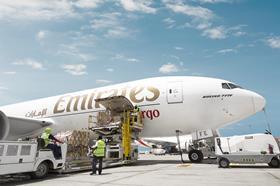
Emirates SkyCargo has highlighted how it has utilised the cargo capacity on its Boeing 777 freighter and Boeing 777-300ER passenger freighter aircraft to help maintain and replenish food supplies in the United Arab Emirates (UAE) during the Covid-19 pandemic.
According to the air cargo carrier, it has helped import more than 34,000 tonnes of food into the country between January and April this year, out of which 13,000 tonnes were imported between March and April.
In the month of April alone, Emirates SkyCargo brought in food supplies into the UAE, including fresh fruit and vegetables, from over 35 countries around the world.
In the UK, London Heathrow airport has been receiving seven flights per week, including both passenger freighter and full freighter flights, however, since 1 May, the frequency of flights has been increased to ten a week.
Over 1,550 tonnes of food was imported into the UAE from UK between Jan and April 2020, including foodstuffs such as fruits, vegetables, blueberries, olives, coffee and cheese.
On imports, Emirates SkyCargo flights have been transporting essential supplies including fresh produce, hand sanitisers and other commodities into London Heathrow.
'Despite the severe reduction in the number of flights we operate and the resultant reduction in the amount of cargo capacity we can work with, we have given top importance to maintain food supplies in the UAE as we consider this our responsibility,' said Nabil Sultan, Emirates divisional senior vice-president, cargo.
'Through our regular cargo flights from major food production markets such as Australia, Egypt, India, Kenya, Pakistan and many other nations, we have been able to import quality food items,' he explained. 'This has helped keep store shelves in the UAE well stocked with the familiar and comfort food items that puts a smile on people’s faces. We are also thankful to the support from the various UAE authorities who have helped facilitate these imports during such critical times.'
Emirates SkyCargo said that it was currently operating flights to around 60 global destinations on a scheduled basis and to many more destinations as charter and ad hoc operations, and food bound for the UAE is loaded onto these flights from markets across the world.
Food imports that Emirates SkyCargo has facilitated since the start of the year included more than 5,200 tonnes of food from Australia including grapes and melons, close to 2,500 tonnes of food from Egypt including strawberries, guavas and vegetables like sweet potatoes, and over 4,000 tonnes of food from India including fresh fruit and vegetables.
The logistics group has also helped to move pineapples and mangoes from Kenya and vegetables from Pakistan.
'In addition to securing UAE food supplies, Emirates SkyCargo also provides a boost to the local economies of the various countries it operates to by providing a lifeline for the agricultural and other produce exporters,' the group outlined. 'The export revenues generated from trade of fruits, vegetables, sea food and meat support the livelihoods of farmers and growers in these regions. Just last week, the air cargo carrier announced that it would be working with the Australian government to facilitate exports of Australian agricultural and sea food commodities.'



